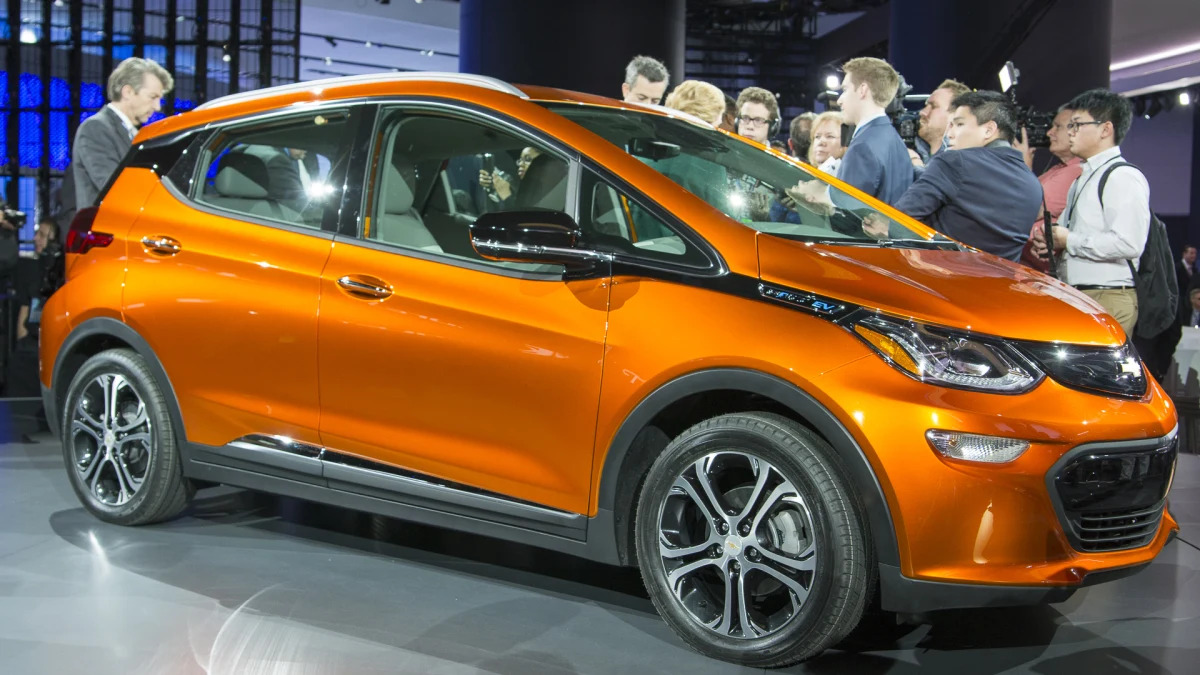I haven't driven many electric cars, but the ones I have driven, the Chevy Bolt EV and the BMW i3, have left me with smiles. I have no doubt that a Tesla Model S or X would as well, but even these more modestly powered (and priced) machines are surprisingly fun. They both handle impressively well, and their electric motors are responsive and linear, making it easy to fine tune throttle inputs. The Bolt EV is even pretty potent with 200 horsepower and 266 pound-feet of torque, while the BMW's rear-drive layout and excellent steering make it distinctive.
Considering how much fun can be had with the standard models, it's great to see BMW introducing the higher-performance i3s. It ticks all the right boxes for a mild hot hatch. It gets updated styling with more aggressive air inlets, fender flares, and wider wheels. BMW also bestowed it with an extra 14 horsepower and 15 pound-feet of torque for totals of 184 and 199, respectively. It allows the little EV to hit 60 mph more quickly -- in 6.8 seconds -- and it reaches a top speed of 100 mph. It also has wider tires and upgraded suspension. It sounds like a strong contender for starting an electric hot hatch revolution.
Except, I'm not sure the average buyer will ever really notice given the i3's inherent "on paper" faults. Although figures for 2018 haven't been announced, the 2017 i3 has a maximum range of 118 miles with its 94 amp-hour battery (there is also a 60 amp-hour version available for $2,000 less), while the i3 REX and its gasoline-fueled motor generator increases that to 180 miles. That isn't terrible at the moment, but it has been eclipsed by the Bolt EV on pure electricity, as well as the upcoming Tesla Model 3. Perhaps more importantly, though, both of those cars are significantly cheaper than the 2017 i3's base price of $45,445 for an electric-only model or $49,295 for the REX.
Put in perspective, that same money could buy a BMW M240i off the same lot or a 230i when you factor in EV tax incentives, not to mention a plethora of other performance cars. Unsurprisingly, sales of an underperforming, arguably overpriced car like the standard i3 haven't been roaring. And since the i3s is certain to cost even more, it seems unlikely to be a sales success either.
Considering how much fun can be had with the standard models, it's great to see BMW introducing the higher-performance i3s. It ticks all the right boxes for a mild hot hatch. It gets updated styling with more aggressive air inlets, fender flares, and wider wheels. BMW also bestowed it with an extra 14 horsepower and 15 pound-feet of torque for totals of 184 and 199, respectively. It allows the little EV to hit 60 mph more quickly -- in 6.8 seconds -- and it reaches a top speed of 100 mph. It also has wider tires and upgraded suspension. It sounds like a strong contender for starting an electric hot hatch revolution.
Except, I'm not sure the average buyer will ever really notice given the i3's inherent "on paper" faults. Although figures for 2018 haven't been announced, the 2017 i3 has a maximum range of 118 miles with its 94 amp-hour battery (there is also a 60 amp-hour version available for $2,000 less), while the i3 REX and its gasoline-fueled motor generator increases that to 180 miles. That isn't terrible at the moment, but it has been eclipsed by the Bolt EV on pure electricity, as well as the upcoming Tesla Model 3. Perhaps more importantly, though, both of those cars are significantly cheaper than the 2017 i3's base price of $45,445 for an electric-only model or $49,295 for the REX.
Put in perspective, that same money could buy a BMW M240i off the same lot or a 230i when you factor in EV tax incentives, not to mention a plethora of other performance cars. Unsurprisingly, sales of an underperforming, arguably overpriced car like the standard i3 haven't been roaring. And since the i3s is certain to cost even more, it seems unlikely to be a sales success either.
Hopefully that won't dissuade other car companies from giving the performance-oriented EV concept a try, as there's so much potential in them. The Bolt EV has the best chance of performance success, and actually would be a better first step into the new, affordable(ish) hot EV world than the i3s. Its motor already has the output to challenge a Volkswagen GTI, and a bit more power would make it that much more fun. Plus, it's more affordable and has a genuinely impressive range right out of the gate. Add in a more aggressive look and better handling, and you'd have a fun performance machine all-around, not just in comparison to other EVs. The Chevrolet Bolt SS has a nice ring to it.
What about other carmakers? Even though Chevy has the best platform, it would be great to see another manufacturer take the leap. How about a NISMO Leaf, for instance? Hyundai could take the affordable and surprisingly nimble Ioniq and create an N model, or Volkswagen could apply GTI goodness to the e-Golf, a progression of sorts of the European GTE plug-in hybrid. Maybe a Honda Clarity Si? Actually, maybe not.
So consider this an open call EV builders: please don't be discouraged by the i3s, bring us more hot electrics!
Related Video:











Sign in to post
Please sign in to leave a comment.
Continue